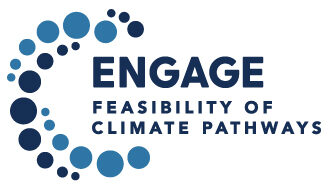Project
What is the aim of ENGAGE?
ENGAGE is a consortium of international and multidisciplinary leading research groups that aims to co-produce knowledge for designing cost-effective, technologically sound, socially and politically feasible pathways that can meet the objectives of the Paris Agreement. ENGAGE will also quantify avoided climate change impacts at the regional and national levels and identify concrete policy portfolios that maximise co-benefits and minimise trade-offs.
What are the objectives of ENGAGE?
ENGAGE has five main objectives:
- Build a legitimate, transparent, and iterative knowledge co-production process rooted in stakeholder dialogue.
- Conceptualise and operationalise multidimensional feasibility of decarbonisation policies and pathways.
- Quantify national avoided impacts of climate change and identify decarbonisation policies that maximise co-benefits and minimise trade-offs.
- Develop a new generation of decarbonisation pathways which represent multidimensional feasibility and reflect all characteristics of the Paris Agreement
- Inform and contribute to the Sixth Assessment Report of the Intergovernmental Panel on Climate Change.

Why is this important?
In 2023, global progress towards the objectives of the Paris Agreement (PA) will be formally assessed. Integrated Assessment Models (IAMs), which combine human and earth systems to help understand how key aspects of society may evolve in the future and how they might interact with a changing climate, have played an important role in identifying pathways that link strategies for achieving long-term goals with near-term actions and milestones.
ENGAGE will use IAMs to produce a new generation of pathways that incorporate cutting-edge social science knowledge to reduce social and political challenges to achieving the Paris Agreement. Such global and national pathways will transparently:
- Investigate the timing of net-zero emissions (a key target in the PA which corresponds to the time when global temperature peaks);
- Accurately reflect the climate policy landscape at national levels; and
- Incorporate potential architectures of international climate cooperation and input from key stakeholders.
How will this be accomplished?
Knowledge co-production will be achieved through an iterative stakeholder dialogue process that will include workshops, surveys and frequent interactions and feedback among scientists, policy makers, civil society, the private sector, and other key stakeholders. ENGAGE will be inclusive of major emitters and selected developing countries which will ensure the credibility and legitimacy of the scientific and policy insights.
ENGAGE will also address a historical shortcoming of IAM-based pathways — insufficient attention to social, political, and certain technological constraints and enablers of mitigation efforts — by developing and operationalising the concept of multidimensional feasibility of decarbonisation policies and pathways. To accomplish this, ENGAGE will utilize empirical analysis, statekholder dialogue, and conceptual insights from the social sciences to develop a tool which will subsequently be used to assess and improve the feasibility of decarbonisation pathways.
ENGAGE will quantify avoided climate change impacts through analysis of the exposure and associated costs for individual sectors and regions to climate change at different levels of and timing for global peak temperature. A particular focus will be on quantifying the benefits (or trade-offs) of climate policies on biodiversity, food, poverty, water, air quality, health, and employment, particularly for vulnerable populations.

